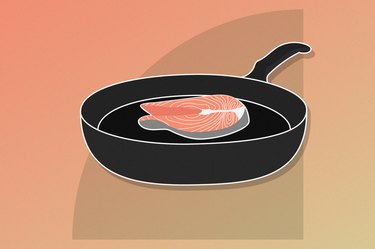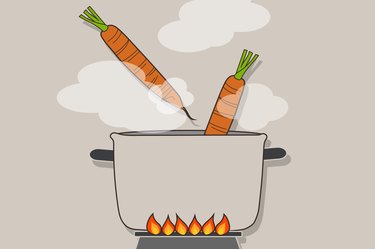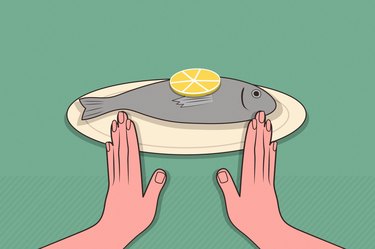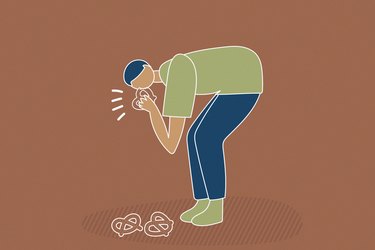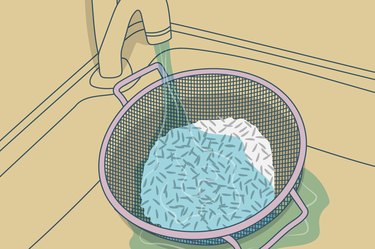
With so many different ways to prepare rice, it's easy to see why there's a debate over whether you should rinse rice before cooking it.
Rice is a staple food around the world. It's eaten by people in more than 100 countries, and there are an estimated 40,000 varieties of rice worldwide, according to the Harvard T.H. Chan School of Public Health.
Video of the Day
Video of the Day
As it turns out, registered dietitians and professional chefs say it's probably worth it to take the extra minute to rinse rice before you cook it. Here's why.
Food experts recommend rinsing dry rice before cooking it because it helps wash away contaminants, heavy metals, dirt and bugs that may be in the rice. As Consumer Reports explains, the type and amount of contaminants can vary depending on the type and source of the rice. However, it may not be easy to determine exactly where the rice you're cooking originated — so some may find it prudent to have a standard practice of a quick rinse.
That said, rinsing rice can also get rid of some beneficial nutrients and yield mushy rice.
The Benefits of Rinsing Rice Before Cooking It
1. It Gets Rid of Contaminants and Heavy Metals
The main reason some health professionals urge you to rinse your rice is because it can be laden with contaminants and heavy metals.
Rice is especially high in arsenic, lead and cadmium, which pose serious health risks to humans, according to November 2020 research in the International Journal of Environmental Research and Public Health.
"You should always rinse rice before cooking," says registered dietitian nutritionist Kimberly Gomer, RDN. "Contaminants get into rice plants from polluted groundwater that floods rice paddies, so the main benefit of rinsing rice is lowering the risk of heavy metal toxicity."
The likelihood of experiencing heavy metal toxicity from eating rice is probably pretty low. Gomer says you would have to eat rice at several meals per day. Though this isn't likely, heavy metal toxicity is especially risky for young children and babies.
2. It Washes Away Dirt and Debris
Buying a bundle of lettuce from the supermarket and eating it without giving it a quick rinse isn't the best idea for the same reasons you shouldn't eat unrinsed rice — it could be covered in dirt, bugs and other impurities.
"Rinsing rice removes things we definitely don't want on our plates, such as dirt, dust, debris, chemicals and bugs," Gomer says.
Grains are especially prone to contamination by rice weevils (aka grain beetles), according to the University of Maryland Extension. They're small insects that can infest food and make it go bad more quickly. If you find bugs in your rice, there's a good chance the infestation can or has spread to the rest of your grains.
"There's a significant chance that rice could collect dust or become contaminated with small bugs, so I always recommend washing it before cooking it," explains celebrity chef Kai Chase.
If you find an infested bag of rice, you should throw it out, per the University of Maryland Extension. The bugs aren't toxic to humans, but the pests can easily spread to your other foods.
3. It Can Improve the Taste and Texture
Rice is a rich source of starch, which can lead to thick, gummy textures when it's cooked. To avoid it, Chase recommends rinsing rice for the best taste and consistency.
"The starch in rice causes the grains to become sticky," she says. "Rinsing rice removes a layer of excess starch, resulting in a fluffier texture and better flavor."
If you don't rinse your rice, it may also clump together.
Related Reading
Potential Downsides of Rinsing Rice
1. It May Sacrifice Some Nutrients
When you rinse away the heavy metals in rice, you may also rinse away some of the beneficial nutrients. Rinsing rice washes away some of the iron, folate, thiamine and niacin in the rice, according to the FDA.
"Excessive rinsing of rice could cause a loss in certain nutrients like B-vitamins including folate, iron, niacin and thiamin, which are water-soluble," explains registered dietitian Bonnie Taub-Dix, RDN. "Fortified rice has a layer of added nutrients, so rinsing fortified rice could cause a loss of nutrients."
2. It May Lead to a Mushy Texture
Gummy rice isn't always a bad thing. Some chefs don't always rinse their rice when making certain rice recipes.
"If you're making risotto, arborio rice, congee, porridge or rice pudding where the rice is meant to be creamy, washing and rinsing the rice or grain can turn it mushy," Chase says. "But this is a highly-debated topic, as some chefs still prefer to wash grains in the name of cleanliness prior to making these dishes."
How to Wash Rice
Rinsing your rice before cooking it only takes a couple of extra minutes and doesn't require a ton of equipment.
Here's how to rinse rice, according to the University of Illinois:
- Pour dry rice into a deep bowl.
- Cover it with water.
- Use your hands to move the rice around in the water.
- Drain the water.
- Repeat this process until the water runs clear.
So, Do You Have to Rinse Rice Before Cooking It?
Rinsing rice helps get rid of unwanted contaminants, but in doing so, you're also getting rid of water-soluble nutrients. In most cases, rinsing rice can improve the texture and prevent it from turning sticky and clumping together.
Otherwise, it's mostly a personal preference, but most experts agree that it's better to rinse rice before cooking it.
- Harvard T.H. Chan School of Public Health: "Rice"
- International Journal of Environmental Research and Public Health: “Toxic and Essential Elements in Rice and Other Grains from the United States and Other Countries”
- University of Maryland Extension: “Rice and Granary Weevils"
- FDA: "What You Can Do to Limit Exposure to Arsenic"
- University of Illinois: “Cooking Rice”
- Consumer Reports: "How Much Arsenic Is in Your Rice?"

